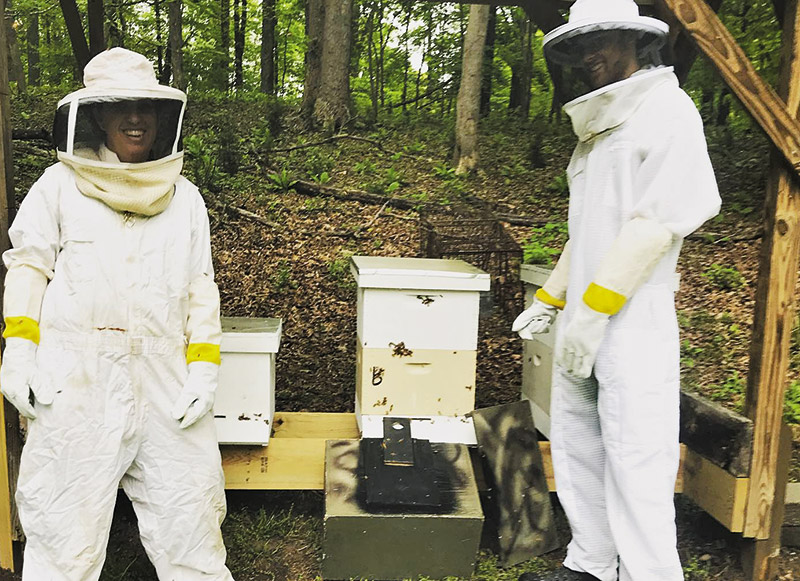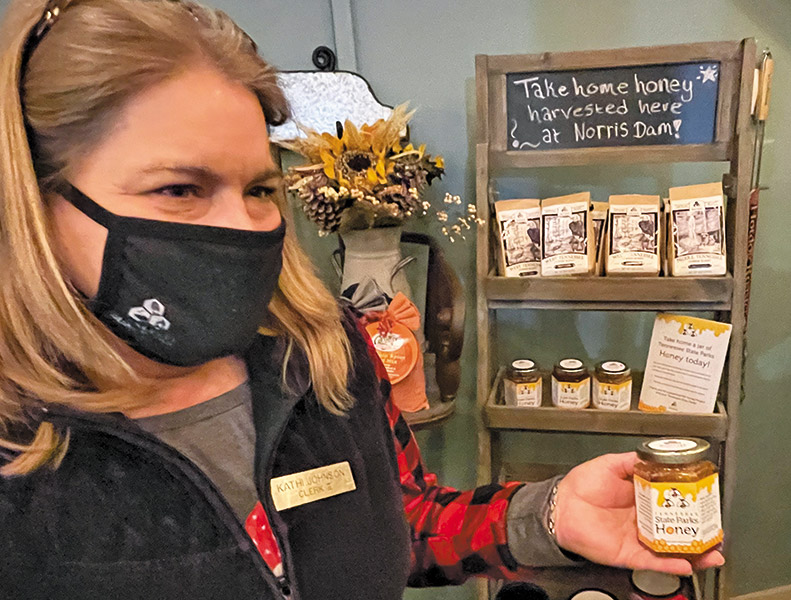Beekeepers
Norris Dam State Park produces its own honey for sale to park visitors
Honeybees are among the newest residents at Norris Dam State Park, brought there in the past year as part of an initiative by the Tennessee State Parks system.
The bees aren’t on public display, but their tasty product – pure honey – is now sold in jars in the Visitors Center at the park headquarters building on the west side, as well as in the Grist Mill gift shop on the east side of the park.
“We bottle the honey for sale at the park, and all of it comes from our own bees and hives,” said Park Ranger Trent Ellen, who runs the bee program for the Norris Dam State Park.
Ellen lives in the park, and keeps the beehives in the backyard at his residence, he said.
“We started at the beginning of last year, and this year we’re in our first full year of doing it,” he said. “Last year, we were able to draw off about 15 gallons of honey.”
The honey is put into six-ounce jars that sell for $8 each, and all the proceeds go right back into the program to pay expenses and help expand the hives, Ellen said.
Norris Dam is one of 31 Tennessee state parks involved in the park system’s “Honey Project.” Nearby, Big Ridge and Frozen Head state parks also have their own honey projects.
According to the state parks’ website (tnstateparks.com/honey-project), the Tennessee Department of Environment and Conservation and Tennessee State Parks launched the Honey Project across various state parks to “promote pollinator and environmental health in our parks,” “provide an experiential learning opportunity for visitors,” and “produce sweet treats for our guests.”
“Since its establishment, the Honey Project has installed honeybee hives at 31 state parks across Tennessee with at least two hives at each park,” the website notes.
“Parks bottle and sell the honey in state park gift shops based on their hives’ production. Honey production fluctuates based on a variety of factors such as the amount of food available in the area. If a park’s hives have produced enough honey, bottling usually occurs sometime between May and September. …
“Since pollinator health is critical to Tennessee’s agricultural, environmental, and ecological health, these tiny insects open the door to discuss myriad environmental issues.”
TDEC has worked with several partners to get the project going, including the state apiarist, Mike Studer, who gave advice on technical issues, beehive health, and community contacts, the park website said.
At Norris Dam State Park, Norris building contractor and now Norris City Councilman Will Grinder and his wife, Deborah, stepped up to help get the local program started. They donated two of their own backyard hives, along with lots of other equipment to start the project on park property, Ellen said.
Grinder said he and his wife got into beekeeping about six years ago, and decided it had become almost too much work for them. So when they heard about the state parks’ honey program, Will Grinder said he approached Park Manager Veronica Greears and offered to help.
“We had enough equipment to put six hives together, and we brought our two hives up,” Grinder said. “They bought some more bees, and the Friends of Norris Dam State Park donated enough money for two hives.”
The Grinders helped Ellen and another ranger with the park hives, and helped drain off the honey.
“We kept about a gallon and a half for our personal use, but all the rest went to the park,” Grinder said.
Ellen said the Grinders provided the equipment to extract the honey, and the state park system gave the park the jars and labels.
Eventually, the park will offer classes and programs to teach visitors about beekeeping and honey production.
“It’s definitely something I enjoy,” Ellen said. “It’s a fun thing to do with your time, and a fun hobby to get into.”
It also has its challenges, Will Grinder said.
“When you try to take the honey out of the hives, it can get stressful -- especially when you have 10,000 or 20,000 bees flying around you trying to kill you,” he said.
Honey is nature’s perfect food, and never goes bad, Ellen said.
“We tell people if you buy it and forget about it, you can put the jar in hot water or microwave it, and it will come back to life and look brand new. It never spoils.”
The park “has seven hives right now, but is looking to add one or two for this year,” Ellen said.
But it does take a lot of work to keep them going, he said.
“During spring and summer when the bees are active, we have to go through every single hive and monitor their health, make sure other bees haven’t come in and taken their honey away,” Ellen said.
“We also have to make sure mites don’t get into the hives. There are medicines we put in the hives to deter the mites.”
The goal for the state parks is “getting more people into beekeeping and producing more bees to help preserve them,” Ellen said. “Half of the food we eat was pollinated by bees. If they were to go away, you can only imagine the impact that would have.”
As for Will Grinder’s role from this point on, “My goal is to help the park out as much as I can, and build their program up,” he said. “It’s a lifetime learning process.”




